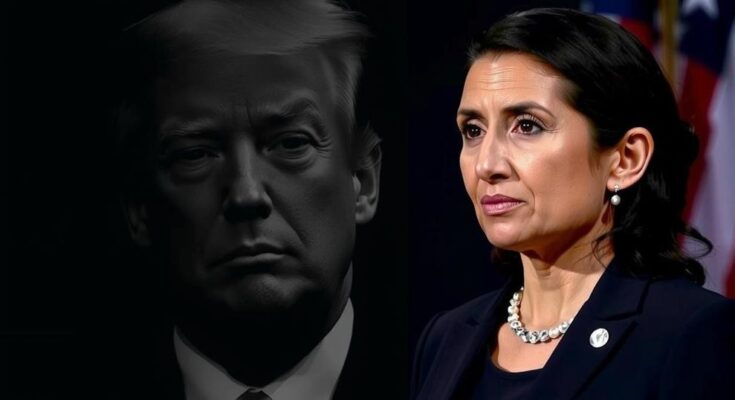Tulsi Gabbard’s appointment as Trump’s Director of National Intelligence has sparked controversy due to her isolationist views and critical stance on U.S. foreign policy regarding Russia, Syria, and Iran. Critics express concern over her qualifications and her divergence from established intelligence practices, adding complexity to her role as a key advisor on national security matters.
In the wake of President Trump’s announcement of Tulsi Gabbard as his Director of National Intelligence, the political landscape is buzzing with controversy. Gabbard’s isolationist views starkly contrast with the Common U.S. strategies emphasizing foreign intervention, drawing ire from critics across the political spectrum, including some within her own party. With years in Congress, her vocal criticism of U.S. roles in Syria, Ukraine, and complex relations with Iran, raises eyebrows about her suitability for the crucial position overseeing a vast intelligence community. As questions arise over her appointment, the direction of U.S. intelligence policymaking remains uncertain. Tulsi Gabbard, a 43-year-old veteran and former congresswoman, is no stranger to breaking barriers as the first Hindu in Congress and hailing from American Samoa. Her military service and four terms representing Hawaii brought her into the spotlight, where she often diverged from party lines, notably as a supporter of Bernie Sanders in 2016. Gabbard’s 2022 departure from the Democratic Party, seeking independence from what she termed “an elitist cabal of warmongers,” was a significant turning point. Her recent endorsement of Trump and alignment with the Republican Party embodies a dramatic shift that amplifies her controversial aura. The role of the DNI is pivotal to U.S. national security, spanning oversight of the CIA and various other intelligence branches. Historically appointed in the wake of the 9/11 attacks, this position serves as a critical advisory role to the president. Despite her lack of formal intelligence experience, Gabbard’s military background and previous service on the Armed Services Committee lend her some credibility, though skepticism about her qualifications remains strong. Gabbard’s foreign policy stances have drawn sharp scrutiny. Her remarks on the Russia-Ukraine conflict have made her a lightning rod for criticism, with accusations of echoing Russian propaganda after advocating for Ukraine’s neutrality. She faced backlash for questioning U.S. actions throughout the Syrian war, including a controversial meeting with Bashar al-Assad. Meanwhile, her harsh critiques of the U.S. approach to Iran under Trump alarmed some who claim her viewpoint undermines national security. Meanwhile, her close ties to India, particularly under Modi’s regime, highlight her complex geopolitical relationships, adding layers to her controversial profile. Recently, Gabbard’s unwavering support for Israel amidst the Gaza conflict has further polarized her image. Dismissing calls for a ceasefire and labeling Hamas a threat to both Israel and global stability, she has distanced herself from the broader anti-interventionist stance prevalent in her earlier messaging. Her critics have voiced concerns over these contradictions and her perceived closeness to authoritarian leaders, raising alarms about her motivations and vision. The reaction from Congress echoes the broader apprehension surrounding her appointment. Critics, including intelligence veterans, have labeled her unqualified and accused her of promoting conspiracy theories. This skepticism is palpable amongst key players who question what her confirmation will mean for U.S. intelligence strategies moving forward. Gabbard’s confirmation hearings in the Senate are anticipated to be contentious, indicating deep divisions over her capabilities and decision-making philosophies. As her nomination unfolds, questions loom large: Will Gabbard’s controversial views disrupt U.S. intelligence policy, or will she moderate her stance to align with broader strategic objectives? What remains assured is the compelling narrative woven in her journey—one that encapsulates the evolving dynamics of American politics and its intelligence framework.
Tulsi Gabbard’s appointment as Director of National Intelligence marks a significant moment in U.S. politics, especially given her controversial views on foreign policy. Known for her isolationist stance, Gabbard’s perspectives on Russia, Syria, Iran, and her close connection to India, as well as her recent political alignment with Trump, have spurred both intrigue and concern among legislators and the public alike. Her past as a military veteran and a four-term congresswoman adds a complex dimension to her candidacy as she steps into a role crucial for national security.
In conclusion, Tulsi Gabbard’s nomination as Director of National Intelligence is layered with significance and skepticism. Her unconventional stances on pivotal foreign policy issues provoke questions about her qualifications and alignments. As the confirmation hearings approach, the outcomes may not only shape her career but also denote the direction U.S. intelligence policies will take under the Trump administration. Whether she can bridge her isolationist tendencies with the demands of national security remains an open question, painting an unpredictable portrait for the future.
Original Source: www.aljazeera.com



